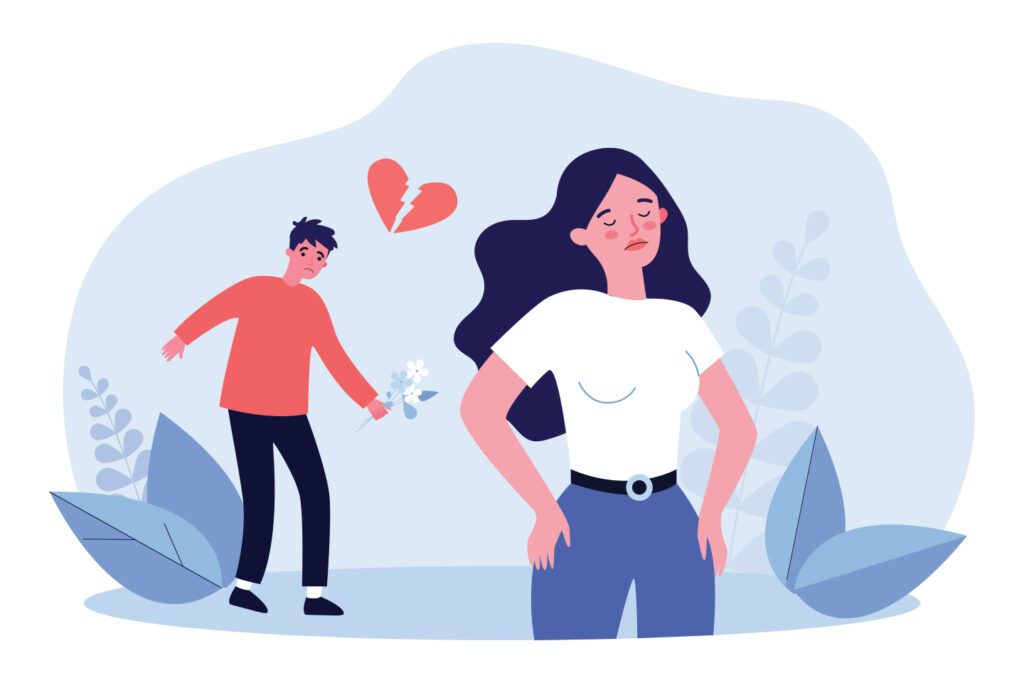Rejection is a scary thing for many people.
Whether you apply for a job, attend a new social event, or try to connect with another person on a romantic level, putting yourself out there means facing the possibility that you will be rejected. In order to learn more about how to cope with rejection in a healthy way, we spoke with Tyler Clemmons, a licensed clinical social worker with Roots Counseling Center.
Rejection is a hard pill for anyone to swallow, but for some it can cause lasting damage. “A lot of times, rejection is a triggering issue that brings people in to therapy,” Clemmons says. “It can be kind of earth-shattering for some people.” Rejection in its many forms is a universal human experience – it happens to everyone at some point, but that doesn’t change the fact that it hurts. According to Clemmons, the reason many of us find rejection to be particularly painful is that it tends to illuminate our deep-rooted insecurities. “A lot of us are very good at avoiding our insecurities, or hiding them from ourselves and others. Rejection tends to magnify our biggest insecurities and forces us to confront them,” he explains.


“Unfortunately, the experience of being rejected can validate whatever insecurities you already have. People tend to take it as evidence to support the worry that they are not good enough,” Clemmons shares. For example, being turned down for a promotion at work can make you feel as though you don’t have what it takes to succeed. Similarly, going through a breakup can bring up worries that there is something inherently wrong with you, or that you will be alone forever. These negative thought patterns are very common, especially for people who have experienced repeated rejections.
“Rejection can taint the lens we view the world through,” Clemmons explains. “After a number of rejections, this can lead us to avoid taking risks or putting ourselves out there for fear of being rejected again.” Though this may seem like a good way to avoid pain, it can end up holding you back in life. For example, you may pass up on a job opportunity or avoid trying to make plans with people you’d like to spend time with – essentially counting yourself out before you even have a chance. This can end up being just as painful as being rejected. Luckily, Clemmons has some advice for coping in healthier ways.
First of all, it is important to challenge negative thoughts when they arise. “Try to step back and ask yourself, ‘Are these negative thoughts true, or are they an exaggeration?’ It can be helpful to try looking at things more objectively,” Clemmons suggests. Reflecting on rejection without jumping to conclusions about yourself and your worth can help you make peace with it. “The most positive outcomes happen when people are able to make sense of a situation,” he says. “For example, ‘that person probably didn’t leave me because of this specific flaw; we just weren’t compatible, and it didn’t work out.’”
Unfortunately, sometimes we are rejected without an explanation, and Clemmons says this can be particularly difficult to process – especially in romantic relationships. “A lot of times I hear people say, ‘I just wish they would have given me feedback about why they didn’t want to pursue anything,’” he explains. “When you don’t get that feedback, you’re left to your own imagination, and that can take us to some pretty dark places.” In these instances, Clemmons suggests spending time with friends and loved ones rather than allowing yourself to be isolated – they can help remind you that you are good enough, even if you don’t feel it.
Finally, it is important to let yourself experience the negative feelings that rejection can bring up – sadness, disappointment, confusion, even anger. Minimizing or bottling up these feelings tends to prolong the process of healing that needs to take place. “Accept and acknowledge your feelings and affirm yourself: ‘I’m proud of myself for trying and having the courage to put myself out there,’” Clemmons advises. If you find yourself unable to move past these feelings, however, it can be helpful to speak with a trusted friend or a professional. At the end of the day, these feelings are part of what makes us human. As Clemmons says, “Rejection is going to hurt, and that’s okay. We’re not meant to be indestructible.”
Accept and acknowledge your feelings and affirm yourself: ‘I’m proud of my-self for trying and having the courage to put myself out there.’”



Tyler Clemmons
Licensed Clinical Social Worker, Roots Counseling Center

